STATEHOUSE REPORT | ISSUE 20.21 | MAY 21, 2021
BIG STORY: Lawmakers have more work to do to rein in opioid crisis
NEWS BRIEFS: A look at the storm season, death row, reform, more
LOWCOUNTRY, Ariail: Bike week
COMMENTARY, Brack: Legislature needs to get it right on making state, jails safer
SPOTLIGHT: ACLU of South Carolina
FEEDBACK: Send us your thoughts, but also provide contact info
MYSTERY PHOTO: Archway
Lawmakers have more work to do to rein in opioid crisis
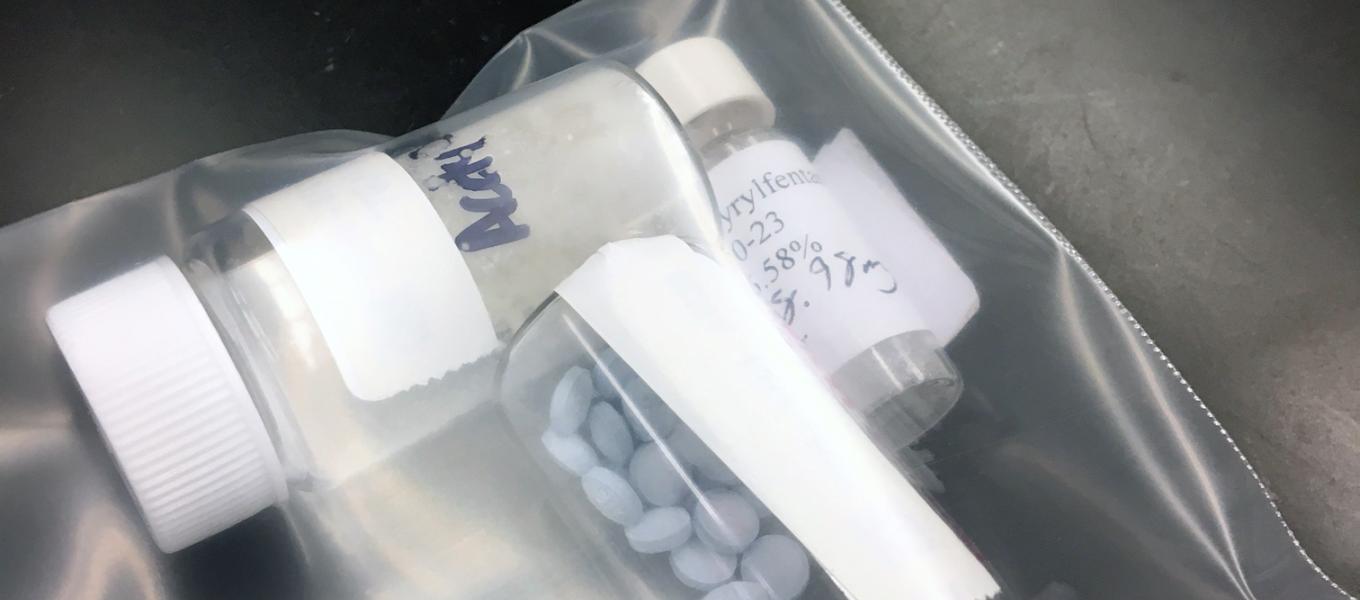
By Andy Brack, editor and publisher | Members of the S.C. House of Representatives say they know they have a lot of work still to do to combat the state’s crisis of opioid addiction, but they also say they’ve come a long way.
In 2018, a special committee of House members released a 29-page report with more than four dozen recommendations, including more monitoring and limits of opioid prescriptions, more education and prevention efforts about opioids’ dangers, tougher criminal penalties, more counseling, more crisis intervention, better infrastructure and new programs. In short: An overhaul of what was being done. Read a 2019 update to the original report.
Since the original report, lawmakers have approved more than a dozen bills to put a dent in opioid addiction including opioid-related measures to monitor prescriptions, requiring informed consent for medications given to minors, updating drug laws, adding some community services, prescription limits, processing changes, and more that $11 million in prevention and capital improvement funding.
“The goal was to study the issue and figure out how the state was to do better,” said S.C. Rep. Russell Fry, the Horry County Republican who chaired the study committee before it sunset in 2020. “Most study committees study and don’t have a success rate with [getting] bills [signed into law], but there’s still a lot of work to be done.”
Despite legislative success, things are getting worse as opioids are the cause of almost 70 percent of the nation’s overdose deaths. South Carolina, a new Quotewizard study says, has the fifth highest overdose death rate in the nation with 1,568 overdose deaths in 2020 compared to 1,107 the year before. Bottom line: As thousands of South Carolinians died from COVID-19 in 2020, overdose deaths went up 41.6 percent.
What’s ahead
Fry said while the committee isn’t formally empaneled anymore, members continue to have bipartisan talks and file bills when new ideas to attack the opioid crisis develop.

“There is not one single magic bullet that will solve it all,” he said, adding that curbing addictions will take a holistic community approach with better access to care, education and prevention as well as improvements for law enforcement.
During the 2021 session, lawmakers started the process to move several opioid-related bills along. One, a measure to require prescribers to offer a prescription to the opioid overdose antidote, naloxone, under certain conditions, was signed into law in April. Pending bills include:
Criminal: Boosting penalties for trafficking in illegal synthetic opioids and trafficking in fentanyl; expanding the definition of involuntary manslaughter to include some drug-related deaths; and allowing the state to expand drug classifications.
Treatment: Expanding methadone use to treat addictions, which Fry said should help rural communities grappling with opioids; and authorization of “deflection programs” to allow police to steer those addicted to opioids into programs before they get in trouble with the law.
Training: More training for coroners and medical examiners to help identify opioid-related deaths.
Despite several bills dealing with criminal penalties, Fry said law enforcement concerns haven’t been a focus of the committee’s work, pointing to millions for treatment and infrastructure in the state’s budget.

But House Minority Leader Todd Rutherford, a Columbia Democrat who served on the study committee, said some of the group’s effort got the wind knocked out of its sails with the coronavirus pandemic.
He said he worried House members were trying to address the problem as it has in the past.
“We keep acting like law enforcement is going to tell us what to do … and they don’t know,” he said. Later he added, “While law enforcement is so busy getting money from it [the opioid crisis] and the legislature is busy passing laws against it, the problem is getting worse. People are dying.”
Rather than rely so much on law enforcement, Rutherford said the legislature needed to look at why people are demanding opioids. On top of that, it should then consider the possibility of legalizing “softer drugs,” such as marijuana, to ease pain and suffering as an alternative that’s not addictive.
“Why we are not trying that when trying the alternative [status quo] led to a 40 percent increase [in overdose deaths] makes no sense.”
Getting ready for something new
Fry said some states are reaping financial rewards in settlements of lawsuits against the makers of opioids. Oklahoma, for example, got $355 million in settlements in 2019. West Virginia received $27 million in an early settlement in 2018 from one company. This year, 48 states, including South Carolina, got a $573 million settlement from a consulting company’s role in the opioid epidemic.
At some point, cases by the state of South Carolina and some of its counties likely will come to a head with a pot of settlement money. And lawmakers should plan now how to make it work to reduce opioid addiction, not spend it on other things, Fry said.
“It’s my hope that when and if our cases settle that a bulk of this would go toward eliminating the problem within the state.”
- Previous coverage: Response to opioid crisis has only just begun, state officials say (June, 6, 2019)
- Have a comment? Send to feedback@statehousereport.com
A look at the storm season, death row, reform, more

Staff reports | Here’s a rundown of what happened in the Statehouse and around the state over the last week:
Tough storm season predicted. Weather officials predicted Thursday that the 2021 storm season, which starts June 1, likely will include “above normal” hurricane activity. They said there is a 70 percent chance that there will be 13 to 20 named storms. And of those, six to 10 are expected to become hurricanes and as many as five could strengthen into major hurricanes. More: National Public Radio | The Post and Courier.
![]() Death row inmates sue after being forced to choose between firing squad or electric chair. South Carolina is now asking death-row inmates to choose between the electric chair and firing squad, citing a lack of lethal injection drugs. More: SC Public Radio | NPR.
Death row inmates sue after being forced to choose between firing squad or electric chair. South Carolina is now asking death-row inmates to choose between the electric chair and firing squad, citing a lack of lethal injection drugs. More: SC Public Radio | NPR.
S.C. lawmakers lean in on jail reform bills. As the fallout around the January death of Jamal Sutherland in a Charleston County jail mounts, members of the South Carolina Legislative Black Caucus is pushing for reforms — in bills already filed and others in consideration as the session breaks. The bills focus on the way law enforcement officials treat people with mental illnesses and seek to ensure more accountability. More: The Post and Courier | WCBD.
Lawmakers favor transparency, but pet projects abound. A survey of 170 state lawmakers in South Carolina say they want more transparency when it comes to budgeting. In the past five years, there have been at least $104 million set aside for pet projects that many lawmakers didn’t know about. More: Myrtle Beach Sun News.
Two S.C. Democrats owe thousands in ethics fines. S.C. Rep. Cezar McKnight, D-Williamsburg, owes $59,150.88 and Rep. Carl Anderson, D-Georgetown, owes $6,000 the Senate Ethics Committee. More: The Nerve.
Legislators grill S.C. juvenile prisons director. South Carolina legislators are pushing to replace the director of the state’s embattled juvenile prisons, who stumbled through more than three hours of questioning Thursday. More: AP News | The State.
Internet access expanding in rural S.C. as part of utility partnership. A pair of rural utility cooperatives announced a five-year, $150 million project to install broadband internet service in the mountainous, far-western reaches of South Carolina. More: The Post and Courier | Spartanburg Herald-Journal.
SCDOT’s paving program to be ‘largest in S.C. history.’ The S.C. Department of Transportation (SCDOT) announced Thursday its new 2021-2022 paving program, which DOT officials promise will rehab nearly 1,000 miles of roads through funding from the state’s gas tax. More: WSPA TV
Bike week
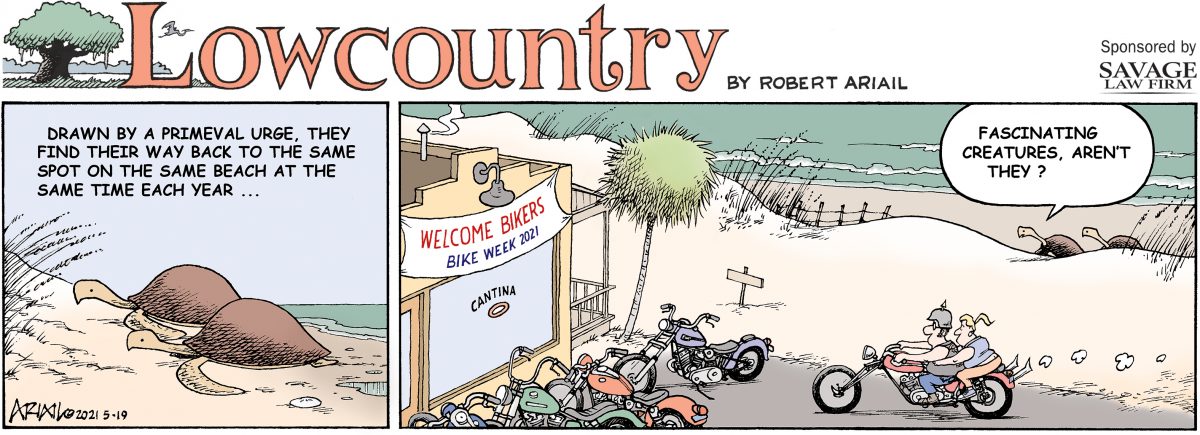
Cartoonist Robert Ariail always has an interesting take on what’s going on in South Carolina. His weekly “Lowcountry” strip is originally drawn for our sister publication, the Charleston City Paper. Love the cartoon? Hate it? What do you think: feedback@statehousereport.com. Check out the Best of Charleston 2021.
Legislature needs to get it right on making state, jails safer
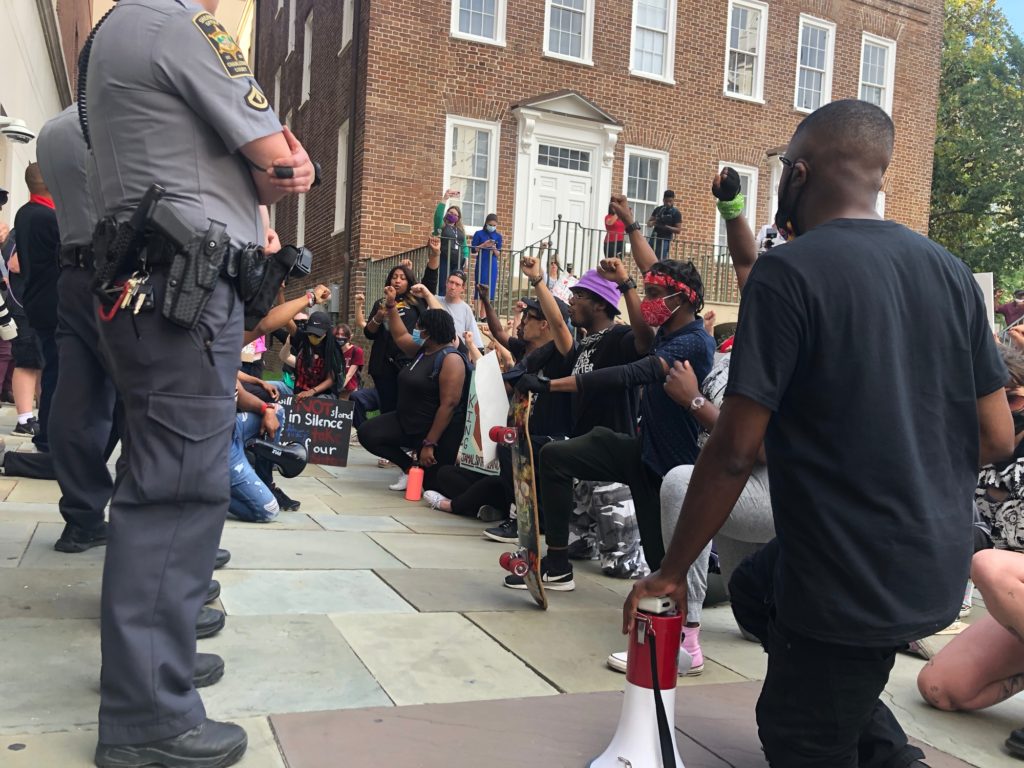
By Andy Brack, editor and publisher | The white majority in the S.C. General Assembly needs to listen to Black colleagues on this: It’s critical for them to work together to make sweeping institutional reforms in jails, prisons and among rank-and-file law enforcement authorities.
 Needless deaths, pain and suffering must stop.
Needless deaths, pain and suffering must stop.
In April 2015, a North Charleston police officer shot Walter Scott, a 50-year-old Black man, in the back after stopping him for having a non-functioning vehicle brake light. The officer went to prison. Legislators passed a law mandating that police wear body cameras. But a newspaper study in 2020 showed the law hasn’t lived up to its expectations due to funding, which is something the General Assembly controls.
In June 2015, a white supremacist shot and killed nine Black worshippers at Emanuel AME Church in Charleston, including state Sen. Clementa Pinckney, a colleague. The shootings gob-smacked the nation. A president sang “Amazing Grace” at Pinckney’s funeral. Yet, six years have passed and nothing has happened to close the loophole that allowed the terrorist, now in prison, to buy the gun used in the slayings.
Then in January, jail officials in Charleston electro-shocked 31-year-old Jamal Sutherland six to eight times with tasers and fired two rounds of pepper spray to try to get him out of a cell to attend a bond hearing. In essence, the prisoner with mental health issues was electrocuted. Officers used extreme violence instead of the simple alternative of rescheduling the hearing.
Nothing good can come from continuing to do nothing to reform a system that allows these kinds of tragedies to happen in the Palmetto State. Continued failure to do nothing will only provide opportunities for the system to continue to fail and more people to die.
Lawmakers must find ways when returning for special sessions this year to get serious and make our state safer, particularly for Black men in the sights of law enforcement authorities. Some ideas:
More training. Did Sutherland really need to be tased up to eight times? Do officers know what each zap does to a body? Better training for authorities surely could have helped in this instance — and scores of others we don’t know about.
More treatment funding. The state needs to plow significant funding to pay for mental health treatment that intervenes before people get into the jail pipeline. It needs more crisis counselors and ways for people to seek help before problems get out of control. Lawmakers should overhaul the crisis safety net. To be clear: This is not a call to “defund the police” and retarget existing resources, but a plea to add more money to pay for better mental health education for the public and law enforcement officers, extra mental health evaluations, more mental health treatment alternatives and infrastructure money for a system that has been crumbling for years. Purchasing more law enforcement toys isn’t going to rectify mental health treatment systems that have been crumbling for decades.
Use the right tools. Are tasers and pepper spray and restraints and guns needed all of the time in all situations? Perhaps authorities need to consider limiting tools of violence based on situational appropriateness. Otherwise, as House Minority Leader Todd Rutherford told The Post and Courier, “When you’re a hammer, everything’s a nail.” The General Assembly can provide guidance and limit overzealous uses of force.
Situations involving confrontation in our society are difficult. Law enforcement authorities have a difficult job and generally do it well. But better training in how to use the right tools, upgrades for the whole mental health safety net, more funding and other institutional reforms can add balance to a system tilted against the most vulnerable.
Lawmakers need to start getting it right because doing nothing, again, is not an option.
- Have a comment? Send to: feedback@statehousereport.com.
ACLU of South Carolina
 The public spiritedness of our underwriters allows us to bring Statehouse Report to you at no cost. This week’s spotlighted underwriter is the American Civil Liberties Union. The ACLU of South Carolina is dedicated to preserving the civil liberties enshrined in the U.S. Constitution and Bill of Rights. Through communications, lobbying and litigation, the ACLU of South Carolina works to preserve and enhance the rights of all citizens of South Carolina. Foremost among these rights are freedom of speech and religion, the right to equal treatment under law, and the right to privacy.
The public spiritedness of our underwriters allows us to bring Statehouse Report to you at no cost. This week’s spotlighted underwriter is the American Civil Liberties Union. The ACLU of South Carolina is dedicated to preserving the civil liberties enshrined in the U.S. Constitution and Bill of Rights. Through communications, lobbying and litigation, the ACLU of South Carolina works to preserve and enhance the rights of all citizens of South Carolina. Foremost among these rights are freedom of speech and religion, the right to equal treatment under law, and the right to privacy.
Send us your thoughts, but also provide contact info
We receive a few comments a week and look forward to publishing. But often we can’t because we can’t verify the identity of the writer.
To be published, you’ve got to provide us with contact information so we can verify your letters. Verified letters to the editor are published weekly. We reserve the right to edit for length and clarity. Comments are limited to 250 words or less. Please include your name and contact information.
-
- Send your letters or comments to: feedback@statehousereport.com
Archway
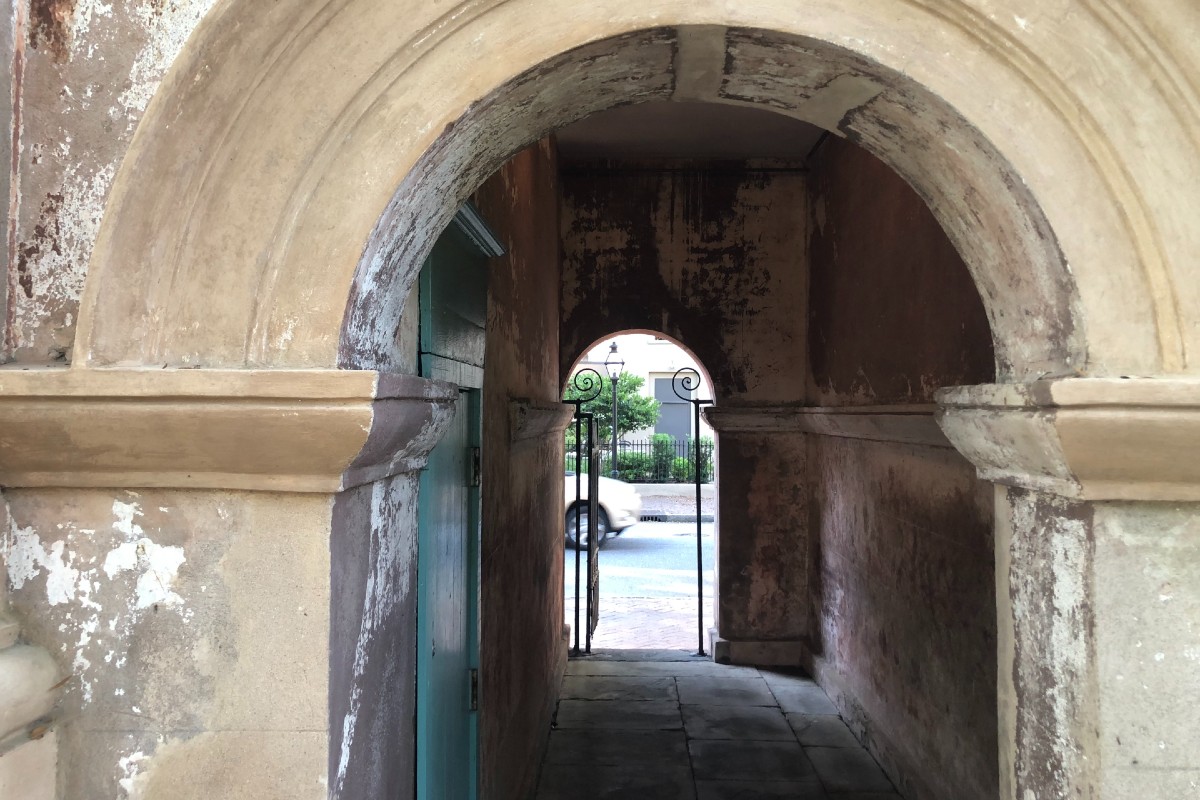
Here’s an interesting-looking archway that may look familiar. Where is it? Send your guess to feedback@statehousereport.com — and remember to include your name, home city and contact information.
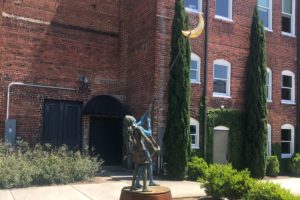 Last week’s mystery, “Moon shot,” came from longtime reader Barry Wingard of Florence, who shared this photo near his hometown’s Hotel Florence of a sculpture showing a man and woman trying to lasso the moon.
Last week’s mystery, “Moon shot,” came from longtime reader Barry Wingard of Florence, who shared this photo near his hometown’s Hotel Florence of a sculpture showing a man and woman trying to lasso the moon.
Several readers correctly identified it, including Kevin Mertens of Greenville, George Graf of Palmyra, Va.; Steve Willis of Lancaster; Allan Peel of San Antonio, Texas; Elizabeth Jones and Jay Altman, both of Columbia; Frank Bouknight of Summerville; and Bill Segars of Hartsville. Good one, Barry!
Peel shared: “The statue is one a number of art pieces that have been installed throughout Florence as a part of the city’s public art initiative. The sculpture is called Luna Caprese Grande and was created by Giacinto Bosco, who was born in 1956 in Alcamo, Sicily, and now works in Milan. You can see some of his other work here.”
- Send us a mystery. If you have a photo that you believe will stump readers, send it along (but make sure to tell us what it is because it may stump us too!) Send to: feedback@statehousereport.com and mark it as a photo submission. Thanks.
ORDER NOW: Copies are in Lowcountry-area bookstores now, but if you can’t swing by, you can order a copy online today.
ABOUT STATEHOUSE REPORT
Statehouse Report, founded in 2001 as a weekly legislative forecast that informs readers about what is going to happen in South Carolina politics and policy, is provided to you at no charge every Friday.
Meet our team
- Editor and publisher: Andy Brack, 843.670.3996
- Special correspondent: Lindsay Street
Donate today
We’re proud to offer Statehouse Report for free. For more than a dozen years, we’ve been the go-to place for insightful independent policy and political news and views in the Palmetto State. And we love it as much as you do.
But now, we can use your help. If you’ve been thinking of contributing to Statehouse Report over the years, now would be a great time to contribute as we deal with the crisis. In advance, thank you.
Buy the book
Now you can get a copy of editor and publisher Andy Brack’s We Can Do Better, South Carolina! ($14.99) as a paperback or as a Kindle book ($7.99). . The book of essays offers incisive commentaries by editor and publisher Andy Brack on the American South, the common good, vexing problems for the Palmetto State and interesting South Carolina leaders.
More
- Mailing address: Send inquiries by mail to: P.O. Box 21942, Charleston, SC 29413
- Subscriptions are free: Click to subscribe.
- We hope you’ll keep receiving the great news and information from Statehouse Report, but if you need to unsubscribe, go to the bottom of the weekly email issue and follow the instructions.
- Read our sister publications: Charleston City Paper (every Wednesday) | Charleston Currents (every Monday).
- © 2021, Statehouse Report, a publication of City Paper Publishing, LLC. All rights reserved.
















 We Can Do Better, South Carolina!
We Can Do Better, South Carolina!